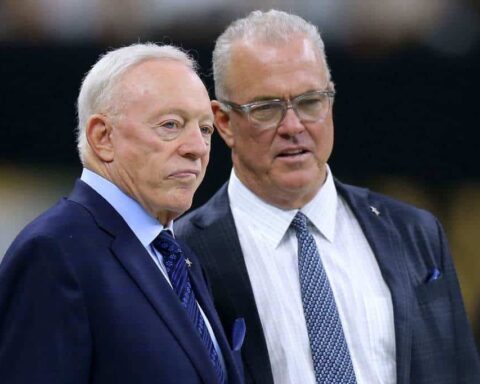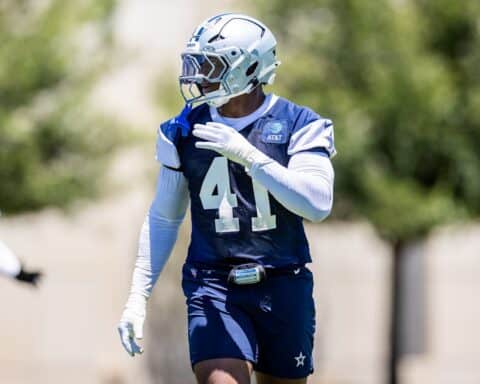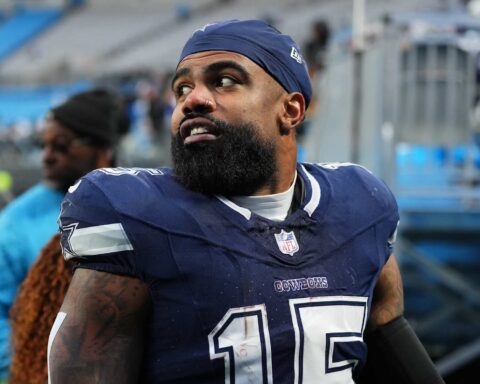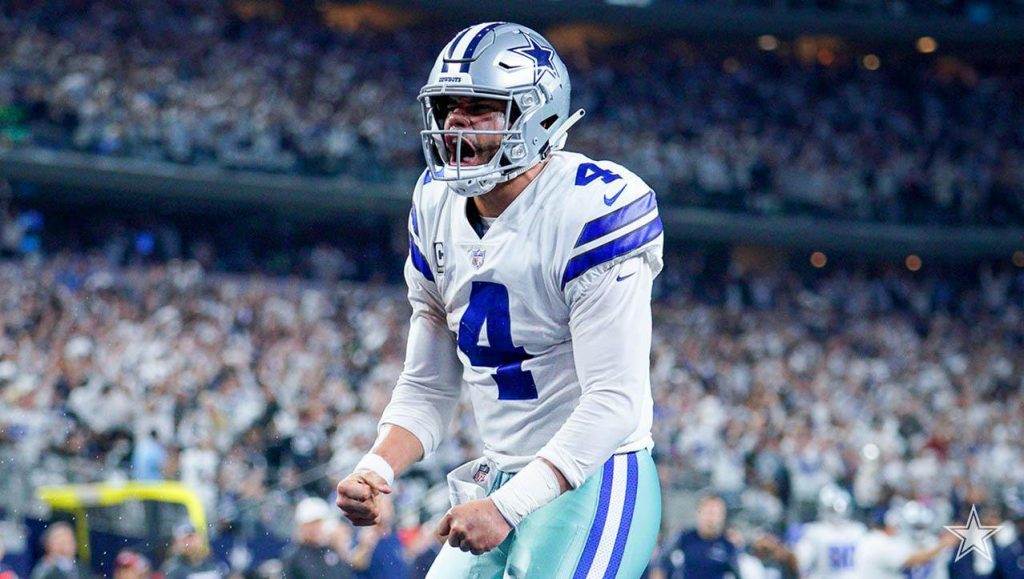Over the course of the past eight months of discussion surrounding Ezekiel Elliott’s contract sides several point of views were taken in the debate. For those of the analytical world, the idea of paying Ezekiel Elliott a top of market contract seemed like a bad idea. For others, the idea of the Dallas Cowboys playing football without Elliott in the long-term plans struck a chord. Others still were okay with the idea of bringing back Ezekiel Elliott with a long-term extension, took a wait and see approach and wanted to see what the contract structure looked like.
If you’d been paying attention to what the front office was saying and what Ezekiel Elliott and his representatives were doing, it was plainly obvious that the Dallas Cowboys were going to extend Elliott before week one. The Cowboys, however, weren’t going to just roll over and let Elliott and his agent get what they want from the jump. That doesn’t afford them the ability to play hardball in other negotiations when necessary.
With the details of the contract now in the forefront, this is one of those deals where everyone involved wins.
How Ezekiel Elliott Won in His Contract Extension
In Ezekiel Elliott’s six-year $90 million extension, he becomes the highest-paid running back in the NFL, which was the goal. His $50 million guaranteed is $5 million more than Running Back Todd Gurley. For any player to be the highest-paid player at their position is a huge win for the player and the representatives.
The Dallas Cowboys weren’t going to roll over and just hand it to Elliott and his threat of a holdout brought this contract into being. Had Elliott been in training camp and not held out, I doubt this contract gets finalized before the season.
As we’ve seen with Dak Prescott and Amari Cooper, who came to training camp, they and the Cowboys appear content to ride out the 2019 season and see where things stand down the road. If Elliott would have attended training camp and attempted to negotiate his contract extension, the Dallas Cowboys front office wouldn’t have felt the pressure to get a deal done.
Being able to get this contract extension finalized just days from opening week one showed just how much value the Dallas Cowboys place on Ezekiel Elliott.
Ezekiel Elliott has been the focal point of the Dallas Cowboys offense each of his first three seasons, but with the move to Kellen Moore and the drafting of Tony Pollard, Elliott may not be run into the ground like he has been his first three seasons.
It’s likely that the Dallas Cowboys increase their rate of pass attempts in 2019 as the NFL moves to more of a passing league. With the progression of Dak Prescott, Elliott may face fewer eight and nine-man boxes in this next part of his career.
With Tony Pollard, the Dallas Cowboys finally have a dynamic running back who can take some of the pressure off of Elliott to carry the load. The Cowboys will be able to give Pollard some of the passing down snaps and potentially more carries than Elliott’s former backups received. If they truly view him as an Alvin Kamara-type player, then they need to make sure they give Pollard Alvin Kamara-type touches.
If the Cowboys pass it more and if they let Pollard handle a higher rate of the running backs snaps moving forward, it will only preserve Elliott for a longer portion of this contract and potentially keep him fresh for crunch time in December, January, and hopefully February.
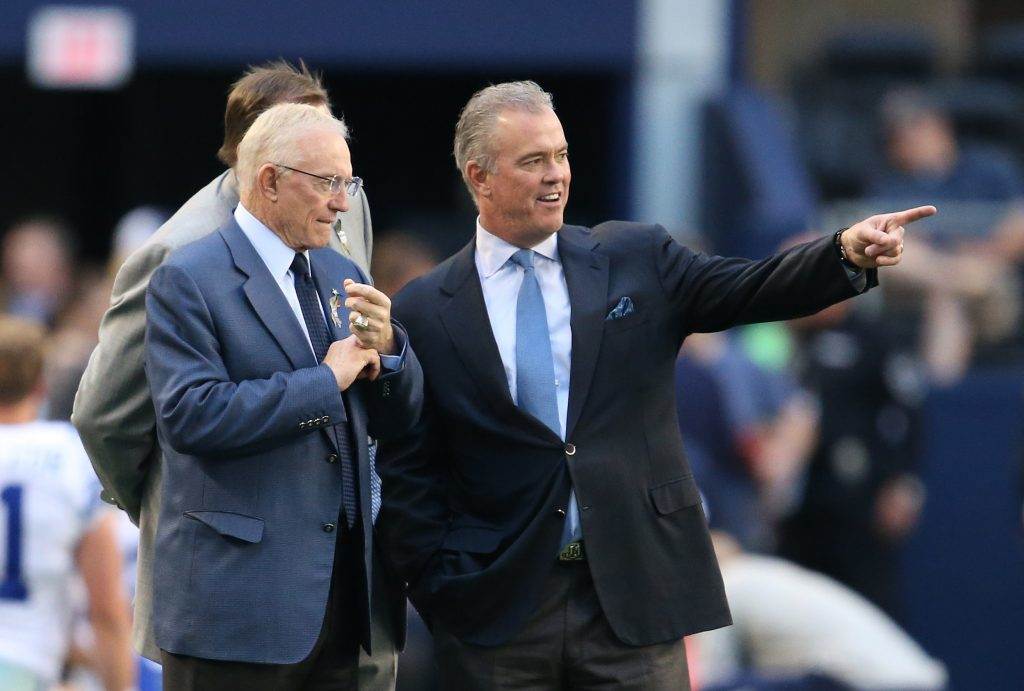
How the Dallas Cowboys Won the Ezekiel Elliott Deal
In the contract structure, the Dallas Cowboys created a way for them to walk away if necessary in 2023. According to OverTheCap.com, the Dallas Cowboys could designate Ezekiel Elliott a post-June 1st release and save $10 million dollars in cap space while accumulating only $6.7 million in dead money. Ezekiel Elliott will get all of his guaranteed money in the first four years of his new contract, which essentially makes the new deal a four-year $50 million contract. The dead money from the deal is related to his prorated signing bonus that gets spread out over the first six years of the contract.
The contract structure allows the Dallas Cowboys to walk away from the deal as Elliott goes into his age 28 season, which is typically the time where running backs begin to experience an age-related decline. The Dallas Cowboys walked away from DeMarco Murray as he was entering his age 27 season.
The Cowboys may value running backs, as they showed by drafting Elliott fourth overall in 2016 and paying him this rich contract, but it’s also evident that they value young running backs. It’s likely that Elliott would have to be playing at a very high level in 2022 for the team to bring him back in 2023. The good thing is, they’ll have the option to do so and his cap hit of $15 million in 2023 won’t hit the cap near as hard as it might in 2020.
Essentially the Dallas Cowboys have team options for four seasons from 2023 to 2026. In order to see the life of the contract, Elliott would have to have a Frank Gore kind of durability and longevity.
How Everyone Else Wins
The Dallas Cowboys are a better football team with Ezekiel Elliott than without him. It’s just true. Though many attempt to attribute the 2017 season to not having Ezekiel Elliott in the lineup, that’s actually a false narrative. The three-game slump around Thanksgiving had more to do with Tyron Smith missing than Elliott.
Though that 2017 collapse had little to do with Elliott’s absence, as a running back, pass catcher, and pass protector, there are few players in the NFL that do it as well as Elliott. He’s the best running back in the league and that makes your offense better.
We’ve seen over the years how much opposing defensive coordinators respect Elliott and the Dallas Cowboys running game. The problem’s been that the passing game hasn’t been aggressive enough at times to make teams pay for walking eight or nine men into the box. With the promotion of Kellen Moore and the addition of Jon Kitna to the coaching staff, the offense should take a step forward in its effectiveness and its aggressiveness.
Ezekiel Elliott draws attention unlike Tony Pollard if would have been the starting running back. With teams paying more attention to Elliott, it will open things up more for Dak Prescott, Amari Cooper, Michael Gallup, Randall Cobb, and Jason Witten in the passing game. Look for the Dallas Cowboys to take more shots down the field in an attempt to exploit 1-on-1 coverages on the outside as the defense loads up to stop the running game.
In addition to Elliott’s ability as a runner, he’s a weapon in the passing game and not only because he caught a lot of passes in 2018. In the Detroit game last year, we saw Ezekiel Elliott streak down the sideline on a “go” route and make a beautiful basket catch to put the Cowboys in position to win that game early in the season. He’s got the potential to be a dangerous weapon in the passing game if Moore sends him on routes that get him further down the field. That ability to catch passes out of the backfield or split out wide makes Elliott more than just an elite runner, but a chess piece in which Moore can use to exploit matchups in the passing game.
While the biggest impact Elliott will have is on the offensive side of the football, he also has an impact on the defense as well. Because the Dallas Cowboys can play grind it out football and go on long drives, it allows the defense to stay fresh throughout the game.
✭ ✭ ✭ ✭ ✭
Though this was a long, drawn-out process to get the contract extension done with Ezekiel Elliott, it’s a deal that’s going to be well worth it in 2019 and in the coming seasons. It remains to be seen how many of the eight years of team control Elliott will be around for, but the deal is a good one for both sides. For Cowboys Nation, the deal means that Ezekiel Elliott will be punishing and hurdling opponents for the foreseeable future with a star on his helmet.
Ultimately, this deal is going to lead to a lot more wins for the Dallas Cowboys.


